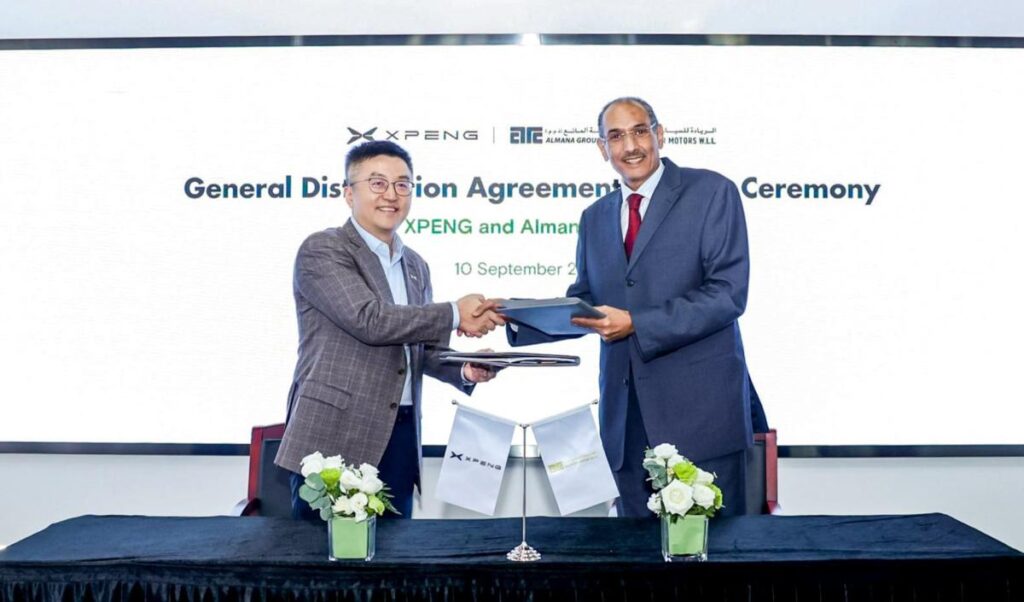Chinese electric vehicle (EV) builder Xpeng will export its cars to Qatar, stepping up its global expansion efforts amid fierce competition in the Chinese market.
The Guangzhou-based company signed an agreement with distributor Pioneer Motors on September 10, marking a first step in responding to consumer demand for high-quality electric vehicles in the Middle Eastern nation, a statement said.
By the end of the year, the directors will Qatar will have the opportunity to purchase several fully electric Xpeng models with self-driving technology, including the P7 sedan and G6 SUV.
Do you have questions about the biggest topics and trends from around the world? Get the answers with SCMP knowledgeour new platform featuring carefully curated content with explanations, FAQs, analyses and infographics, brought to you by our award-winning team.
“Entering the Qatari market is a strategic move for Xpeng,” said Alex Tang, the automaker’s general manager of international markets. “It not only strengthens our presence in the Middle East, but also complements our mission to provide smart, environmentally friendly transportation solutions on a global scale.”
Known for its autonomous driving technology, Xpeng is aggressively expanding into markets outside mainland China in an effort to find new growth engines.
Foreign sales accounted for 10 percent of the company’s total sales of 30,207 vehicles in the second quarter of this year, the company said in an earnings report last month.
Currently, Xpeng also sells its cars in markets such as Thailand, France And AustraliaThe company also offers customers right-hand drive cars in Hong Kong.
A number of Chinese electric vehicle manufacturers, including by Dthe world’s largest EV builder and start-up Hozon New Energy Automotive are strengthening their global strategies while a fierce discount war rages at home.


Representatives of Xpeng and Pioneer Motors shake hands during a signing ceremony for their distribution agreement. Photo: Xpeng alt=Representatives of Xpeng and Pioneer Motors shake hands during a signing ceremony for their distribution agreement. Photo: Xpeng>
In late July, Xpeng said it had expanded the use of its self-driving system to all cities in China in an effort to attract more buyers before Tesla’s fully self-driving software rollout expectedTesla’s software has not yet been approved for use in the country, but testing is expected to begin in the first quarter of 2025.
With this move, Xpeng became the first automaker in mainland China to offer a semi-autonomous driving system nationwide.
Xpeng cars equipped with the software are considered semi-autonomous, as drivers are still required to intervene under certain circumstances.
“For Xpeng, the go-global drive is still in its early stages as the company needs time to build its image outside China,” said Gao Shen, an independent analyst in Shanghai. “But it needs to accelerate its pace of international expansion amid intense competition in China.”
According to a report by credit rating agency Moody’s released in late August, Latin America, the Middle East and Southeast Asia are emerging as major export destinations and production sites for Chinese EV manufacturers.
In these regions, geopolitical risks were lower and EV adoption increased as gross domestic product per capita grew and progress was made on climate change initiatives, the report said.
In May, the US quadrupled import duties on electric cars made in China, now standing at 100 percent.
Last month, the European Union announced it would impose additional import duties of between 9 and 36.3 percent on electric cars imported from China, 11 months after the EU launched an anti-subsidy investigation into battery-powered cars assembled on the mainland.
This article originally appeared in the South China Morning Post (SCMP)the most authoritative voice covering China and Asia for over a century. For more SCMP stories, explore the SCMP app or visit the SCMP’s Facebook And Twitter pages. Copyright © 2024 South China Morning Post Publishers Ltd. All rights reserved.
Copyright (c) 2024. South China Morning Post Publishers Ltd. All rights reserved.







